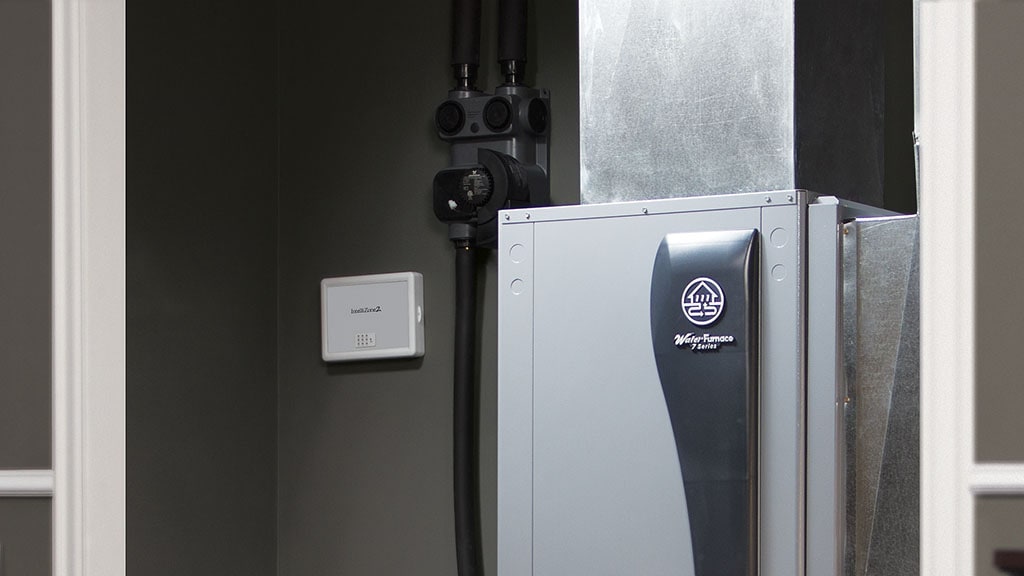Geothermal Replacement
Geothermal replacement systems are reliable, energy-efficient, and environmentally friendly. But they can be tricky to install, which means you need to choose the right company when the time comes for a new system.
At Ground Loop Heating and Air Conditioning, we are one of the most experienced geothermal installers in the entire country and have installed thousands of custom residential systems in the Maryland, Pennsylvania, and Delaware area. Our design team can create a custom system that fits perfectly with your home or business.
We will work closely with you to determine the ideal system for your needs while providing flexible financing options to help you complete your purchase. We'll even handle any necessary rebate paperwork to ensure that your system is as affordable as possible.
We're proud of our A+ rating from the Better Business Bureau because it tells you we are a reliable company you can trust. We are IGSHPA-certified, as well as a member of the Geothermal Heat Pump Consortium (GHPC). When it comes to experience and commitment to quality, we are simply the best choice in the Cockeysville, MD, and the surrounding area to upgrade your geothermal system.
Conventional to Geothermal Replacement
At Ground Loop Heating and Air Conditioning, you are working with a company that has installed thousands of geothermal systems over the years. If you are interested in converting your conventional heating, ventilation, and air conditioning (HVAC) equipment with a geothermal heat pump system, you came to the right place!
Whether you are interested in cost savings, environmental friendliness, or comfort, geothermal systems simply make sense. Geothermal systems often pay for themselves in less than five years while also making your Cockeysville, MD home more comfortable, economical, and quiet. These systems are so affordable that tens of thousands of homes are being built or retrofitted to take advantage of geothermal energy. Compared to other HVAC systems, geothermal systems have a much lower life cycle costs no matter where you live.
Our company specializes in the installation of WaterFurnace geothermal systems for residential, and light commercial. According to the US Department of Energy (DOE), geothermal systems save homeowners as much as 50 percent on their cooling costs and up to 70 percent on their heating costs when compared to conventional systems.
Types of Loop Systems
There are two general types of geothermal loop systems: closed and open. Open-loop systems in our geographic location tend to be more problematic due to poor groundwater quality. That's why we traditionally recommend closed-loop systems. All loop systems are created equal and no one loop is better than another as long as it gives you the required heat transfer in the ground.
In closed-loop systems, there are several installation methods to achieve a closed-loop. There are many opinions about what type is the best. The final answer is all loop types are created equal! Horizontal or vertical, slinky, or straight pipe, these loops are equal because they are designed to be equal. As long as your loop is designed to reach a certain EWT (or entering water temperature) to be determined by your local installer, and to exchange between 5 and 10 degrees Fahrenheit, then the loop will work. The best loop is the loop that fits your needs and budget.
Closed Loops
Closed-loop systems are the recommended geothermal installation method in the Maryland area. In this type of system, water or a water and antifreeze solution is circulated through a buried pipe. The length of the pipe depends on a variety of factors, including the ground's thermal conductivity, temperature, and moisture levels. When installed properly, closed-loop systems are efficient, economical, and reliable.
Open Loops
In an open-loop system, groundwater is drawn up from one well via an aquifer, which passes the water through the heat pump's heat exchanger and is finally discharged to the aquifer through a second well that is located a short distance from the first.
For an effective heat exchange, 2 to 3 gallons per minute per ton of capacity are typically necessary. Because the temperature of groundwater is nearly constant throughout the year, open-loop systems are a popular option in areas where they are allowed and have been used successfully for decades. However, there are several challenges associated with open-loop systems:
The chemical conditions of some local groundwater sources can foul the heat pump's heat exchanger. In these situations, extra precautions may be needed to keep gasses in solution in the water source.
Water use and discharge methods must be cleared with local officials to ensure compliance with environmental regulations and concerns. Increasing environmental concerns mean that local officials must be consulted to ensure that you comply with all regulations concerning water use and accepted water discharge methods. It's rarely acceptable to discharge wastewater to a sanitary sewer system.
Horizontal Loops
For small installations where there is adequate land available, horizontal loops are usually the most cost-effective option. In this type of system, up to six pipes are buried in trenches in parallel connection with at least one foot between pipes and 10 to 15 inches between each trench. Slinky-style loops are also very common.
Vertical Loops
In many situations, vertical closed loops are the preferred solution because They require very little space. Ground Loop Heating and Air Conditioning has even installed vertical loops directly in a driveway on a 1/8th of an acre, and its townhouses. For example, many schools and commercial buildings rely on vertical loops because a horizontal loop system would simply require too much space.
Because of small size, vertical loops are the most common. Depending on the ground conditions, the length of the loop can vary between 200 and 400 feet deep of vertical drilling.
There are two styles of vertical drilling that are used in our area. Air rotary drilling utilizes high-pressure air to drill through hard rock structures and is commonly used in areas west of route 95. Mud rotary drilling uses recirculated high-pressure water to drill through mud, sand, clay, and gravel and is generally used east of route 95.
Pond Loops
Pond loops are a type of closed loop system that takes advantage of an existing pond or stream. If the body of water is deep enough and has enough flow, then a system of closed loop coils can be placed on the bottom of the pond. The fluid is then pumped as with a conventional closed loop ground system. Pond loops have not been shown to damage nearby aquatic systems and they are an economical option when the conditions are suitable.
Geothermal to Geothermal Replacement
Whether you want to replace an older geothermal system, or you are simply want an upgrade, our expert team at Ground Loop Heating and Air Conditioning will offer you the best solutions to fit your Cockeysville, MD, and the surrounding areas, home, or business.
We only use the highest quality materials and we guarantee our loops for 20 years! We believe in our products, and we are confident you will be 100-percent satisfied with our work.
Our company uses multi-speed geothermal systems so that your equipment can be sized for both your heating and cooling needs. This allows for maximum efficiency in the winter, but also allows for proper humidity control in the summer. We incorporate detailed information about your home or business, as well as our extensive experience, to recommend the ideal type of unit and loops for your home.
Contact Ground Loop Today!
At Ground Loop Heating and Air Conditioning, we are the premier providers of horizontal, vertical, and pond loop systems for homes and businesses in Cockeysville, MD, and the surrounding areas. We have the experience and knowledge necessary to build the right system for your needs. To learn more about what we can do for you, call 410-836-1706 or request service online today for your free, no-obligation estimate.


